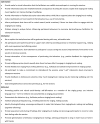Singing for people with aphasia (SPA): a protocol for a pilot randomised controlled trial of a group singing intervention to improve well-being
- PMID: 30206095
- PMCID: PMC6144319
- DOI: 10.1136/bmjopen-2018-025167
Singing for people with aphasia (SPA): a protocol for a pilot randomised controlled trial of a group singing intervention to improve well-being
Abstract
Introduction: The singing for people with aphasia (SPA) intervention aims to improve quality of life and well-being for people with poststroke aphasia. A definitive randomised controlled trial (RCT) is required to assess the clinical and cost effectiveness of SPA. The purpose of this pilot study is to assess the feasibility of such a definitive trial and inform its design.
Methods and analysis: A two-group, assessor-blinded, randomised controlled external pilot trial with parallel mixed methods process evaluation and economic evaluation. Forty-eight participants discharged from clinical speech and language therapy will be individually randomised 1:1 to SPA (10 group sessions plus a resource booklet) or control (resource booklet only). Outcome assessment at baseline, 3 and 6 months postrandomisation include: ICEpop CAPability measure for adults, Stroke and Aphasia Quality of Life, EQ-5D-5L, modified Reintegration into Normal Living Index, Communication Outcome After Stroke, Very Short Version of the Minnesota Aphasia Test, Service Receipt Inventory and Care Related Quality of Life. Feasibility, acceptability and process outcomes include recruitment and retention rates, with measurement burden and trial experiences being explored in qualitative interviews (15 participants, 2 music facilitators and 2 music champions). Analyses include: descriptive statistics, with 95% CIs where appropriate; qualitative themes; intervention fidelity from videos and session checklists; rehearsal of health economic analysis.
Ethics and dissemination: NHS National Research Ethics Service and the Health Research Authority confirmed approval in April 2017; recruitment commenced in June 2017. Outputs will include: pilot data to inform whether to proceed to a definitive RCT and support a funding application; finalised intervention manual for multicentre replication of SPA; presentations at conferences, public involvement events; internationally recognised peer reviewed journal publications, open access sources and media releases.
Trial registration number: NCT03076736.
Keywords: aphasia; clinical trials; group processes; rehabilitation medicine; stroke.
© Author(s) (or their employer(s)) 2018. Re-use permitted under CC BY-NC. No commercial re-use. See rights and permissions. Published by BMJ.
Conflict of interest statement
Competing interests: All authors report the Stroke Association funding for the work under consideration but no other conflicts of interest.
Figures
References
-
- The Stroke Association. State of the Nation Stroke Statistics 2016, 2017. https://www.stroke.org.uk/sites/default/files/stroke_statistics_2015.pdf (accessed 16 Feb 2017).
-
- Devon Wide Stroke Group. Health Equity Profile for Stroke, 2009.
-
- Cruice M, Worrall L, Hickson L. Quantifying aphasic people’s social lives in the context of non‐aphasic peers. Aphasiology 2006;20:1210–25. 10.1080/02687030600790136 - DOI
Publication types
MeSH terms
Associated data
LinkOut - more resources
Full Text Sources
Other Literature Sources
Medical
Miscellaneous


